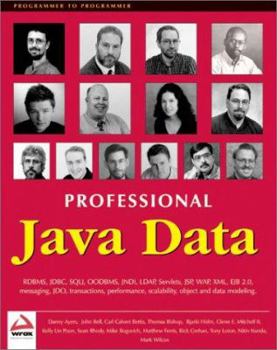Professional Java Data: RDBMS, JDBC, SQLJ, OODBMS, JNDI, LDAP, Servlets, JSP, WAP, XML, EJBs, CMP2.0, JDO, Transactions, Performance, Scalability, Object and Data Modeling
Java is a fast maturing development platform. The cross platform programming interfaces it provides now cover every aspect of development from smartcards to enterprise systems. Having read Pro Java... This description may be from another edition of this product.
Format:Paperback
Language:English
ISBN:1861004109
ISBN13:9781861004109
Release Date:January 2001
Publisher:Wrox Press
Length:1320 Pages
Weight:4.28 lbs.
Dimensions:2.4" x 7.4" x 9.1"
Customer Reviews
2 ratings
Wrox May Need To Review Its Book-Publishing Process!
Published by Thriftbooks.com User , 23 years ago
I mostly agreed with Eric Ma. There are some areas that Wrox needs to review the whole process of publishing Java-related books. Here are some drawbacks that I can draw from reading recent Java-related books:(1) Repeated Contents: Materials about Servlet, JSP, EJB, JNDI, JDBC, XML, etc are repeated over and over many books. This could waste time, money, and papers for both Wrox and readers. (2)Books or Articles?: I asked myself: is Wrox publishing books or articles? Each book is written by many authors and the book's flow is inconsistent. The assessment that it is not a book but a collection of articles may partially true. It is true that a book if written by a team of authors could speed up the process of releasing it, but if Wrox editors and coordinators have to do their better jobs.I suggest that Wrox should review its strategy of publishing books to avoid the repeating of materials over and over and thus bring down the cost associated with publishing the books. The final result is: readers and publisher will both save time and money. Otherwise, readers will loose their belief with Wrox.
Decent survey of JDBC, but with extra fat to be trimmed
Published by Thriftbooks.com User , 23 years ago
For the past 2 years Wrox has been publishing books dedicated to Windows-based data access (ADO etc.), but the same cannot be said about their Java/database collection. Although you find chapters on JDBC scattered all-over almost all server-side Java related books by Wrox, there was no single volume from them that teaches JDBC first, and then show how it is used by the newer dependent technologies, until this book arrived. After looking through this book, I must say the authors and editors have done a rather commendable job. Why do I make the above conclusion? Let me give you my general impression of the book first. A theme repeated in several of my recent reviews on books from Wrox is about the problem in coherence associated with multi-author books. Well, having more than a dozen of authors for a single book seems to be a fact of life (for books from Wrox at least) now, as the publication cycle gets shorter. I was rather surprised to find out that the organization and coherence is very good in this book, i.e., there is very little overlap among chapters. Also, this books uses JDBC cleverly to tie other pieces of J2EE together, making smooth transitions from one chapter to another. If you want to know, this factor alone prompted me to add an extra star to the overall rating of the book. Let's now run down the chapters of this book quickly. The first 115 pages deals object-oriented and database modeling, and can be skipped by any "Professional" developer. Then after your obligatory intro to JDBC API, the next chapter covers the JDBC 2.0 optional package. This is the best treatment of this topic I have seen. Then another chapter is all about SQLJ, another first. The effort of having a chapter on database performance should be lauded, where connection pooling, prepared statements and stored procedures usage are demoed. The reminder of the book is about applying JDBC in various J2EE components, such as JSP, servlets, EJB, JMS, and XML. For this part of the book, even though I accept the fact the proper stage has to be set for each one of them, I still don't believe the book found the right balance between focusing on JDBC and showing what these other technologies are about. A large number of pages are used to teach basic JNDI, servlets, JSP's, and EJB's stuff (remember there is already a book on J2EE from Wrox!). Therefore, it is up to the reader to discover the real nuggets of gold hidden in this pile, which are far and in between in places. I found that some critical issues are not highlighted or details are lacking, such as how to use connection pooling/data sources in servlets, JSP's, and EJB's, the threading issues related to sharing database connections, and good database practices in BMP EJB's. However, the one thing I cannot complain about is that the book did not forget to teach the transaction aspect of EJB with a good depth (there is a short ans sweet chapter on using JTA/JTS inside EJB). There is also a chapter on th






